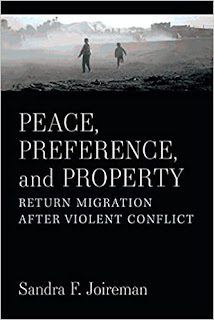
She applied the "Page 99 Test" to her new book, Peace, Preference, and Property: Return Migration after Violent Conflict, and reported the following:
Page 99 of Peace, Preference, and Property discusses the case of return migration to Liberia after the second civil war ended in 2003.Visit Sandra Joireman's website.When and how people return to their communities of origin varies across contexts. The return experience in Liberia highlights the benefits and challenges of customary tenure systems in accommodating returnees after lengthy displacements. In northern Uganda, after peace was established, most of those internally displaced people returning home did so over a relatively short period of time (three to four years), although they did not necessarily rebuild their houses where they were previously located. Liberian return migration was different, with people returning to their communities of origin sporadically over many years, often with long sojourns in intermediate locations.The Page 99 Test is somewhat helpful in identifying the core content of the book as it pertains to one of the case studies that I use in the book and highlights the fact that return migration looks different across contexts. What it does not show the reader is the overall scope of the problem of forced displacement as a result of violent conflict, the focus on individual preferences for return, and the possible solutions. I doubt that the Page 99 Test is the most helpful method of assessing the content of this book. The intent of this book is to package academic research and make it accessible to general readers, policymakers, and others specifically interested in the problem. Because of that wide readership and nature of the content - which engages international law as well as both qualitative and quantitative data – I have tried to make the introduction a clear and compact assessment of the book. For that reason, I would think any page in the introduction would be more helpful in identifying the core content of the book than page 99. That said, I can also see how this might not be the case for other types of books.
One of the things I try to do in this book in order to make it more accessible to the general public and to policymakers is to include first person accounts from interviews I have conducted with forcibly displaced people around the world. Those interviews have changed the way I think about forcible displacement. Specifically, they have helped me understand forcible displacement as an intergenerational problem. Often people are displaced for so long that they raise their children in places of refuge and those places of refuge become home for the children raised there, influencing their desire to return to a ‘home’ they do not remember.
--Marshal Zeringue



